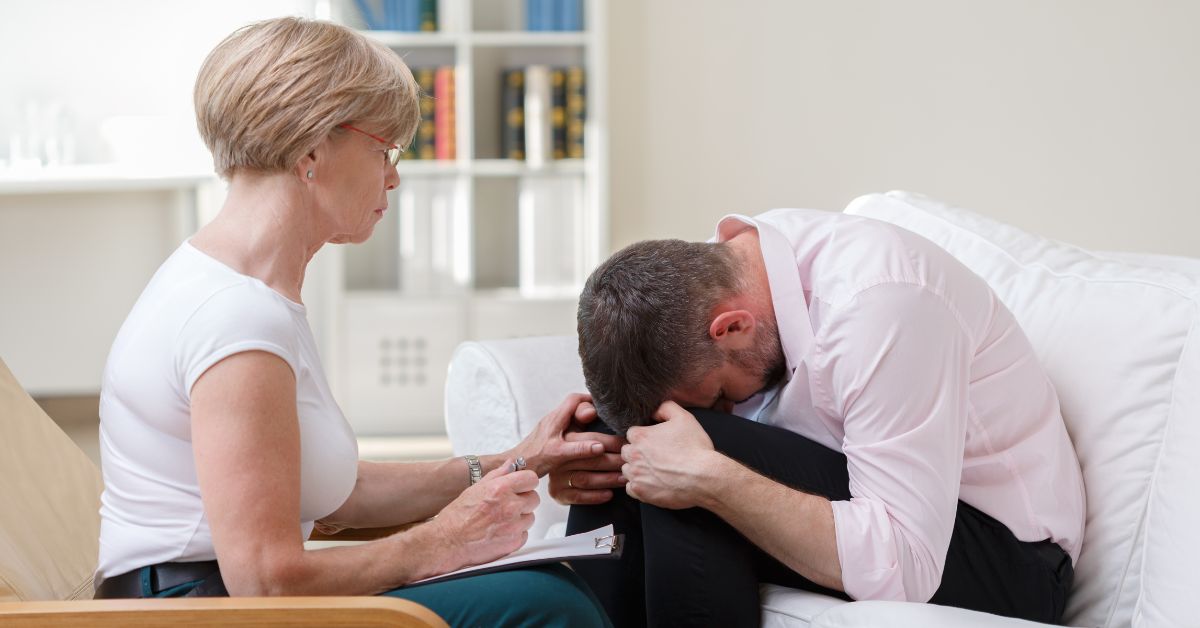Have you ever felt like even the most straightforward actions can sometimes be the hardest to take? It’s like climbing a mountain, making a significant personal change, or traveling to the moon; it all starts with just one small step.
This article will discuss why this first step is essential and how it can be accomplished. We’ll explore the scientific, psychological, and personal aspects of the journey to recovery and offer some practical tips for overcoming this challenge. Taking the first step can become easier with the correct information and support.
Embarking on this journey requires both mental and emotional strength. Let’s delve deeper into the reasons behind hesitation and explore ways to regain control. Remember that every journey begins with a single step, no matter how long it may seem.
Acknowledging and Admitting Powerlessness: A Vital First Step
Denial can become a robust defense mechanism for someone struggling with addiction. It protects them from facing the harsh reality of their situation.
However, denial can actually make the problem worse. It becomes the biggest obstacle to recovery, making it difficult for people to confess they are powerless over their substance use. It also increases feelings of anxiety and depression, making the situation unmanageable.
This admission, which is the first step to healing, is not a sign of weakness but a powerful act of courage. It’s a massive shift in your loved one’s thinking and a critical moment in recovery.
The Role of Denial in Substance Use and Abuse
When someone struggles with substance abuse, they might not want to admit it to themselves or others. If someone you love has this attitude, they might be an addict in denial. However, this can make getting help hard and worsen their addiction. Different examples of denial include:
- Minimizing: The issue is downplayed, creating the illusion that it’s controllable and no big deal.
- Blaming: The responsibility for drug use is placed on external factors, like stress, friends, or problems at work.
- Ignoring: The individual refuses to acknowledge the existence of the problem.
GET: The 3 things that actually "allowed" me to help my son (and regain control again)
Why Admitting Powerlessness is Crucial in Drug and Alcohol Treatment
It can be difficult for someone struggling with addiction to admit that they’re not in control. But admitting powerlessness can be a decisive first step in the recovery process, and it can help your loved one make better decisions during recovery.
- Being Honest: Represents a realization of the severity of the problem, serving as a catalyst for change.
- Breaking Free: Allows individuals to break the false barriers of control established by their addiction.
- Accepting Help: Opens the door to seek and get assistance.
What is Acceptance?

When struggling with addiction, your loved one must accept that they have a problem before getting better. By being honest with themselves and others about their substance use disorder, they can move forward and get the help they need.
How Acceptance Counters Denial
Confessing addiction is a process consisting of the following:
- Understanding the Reality: It begins with understanding and acknowledging the existence and extent of the addiction problem.
- Discarding Lies: It’s about stopping downplaying addiction and recognizing that denying the situation makes it challenging to keep going.
- Facing the Facts: It also involves facing the uncomfortable truths about how addiction has affected someone’s life and relationships.
Tips for Practicing Acceptance
Practicing acceptance is a skill that can be built up with time and patience. You can help your loved one with this step by encouraging them to:
- Be Honest: Openly acknowledge what they’re going through.
- Seek Help: Seek professional help through counseling, therapy, or support groups.
- Involve Everyone: Share their journey with supportive friends and family members.
WATCH: Free, confidential workshop that explains how to "Love Another Way"
The Treatment Process in an Addiction Recovery Center
Rehab centers are beacons of hope. These facilities offer a structured support system, effective time management in recovery, medical intervention, compassionate human interactions, and a secure environment to rediscover self-worth and begin the healing process.
Understanding what to expect during your loved one’s treatment is vital. Choosing the appropriate treatment program and support groups will give them the tools to overcome addiction and stay committed to sobriety.
The Role of Recovery Programs
Treatment centers offer more than just medical care to individuals dealing with addiction; they provide a safe, supportive space for healing.
- Structured Treatment: They provide addiction treatment plans tailored to someone’s unique needs.
- Professional Guidance: Their staff includes professionals with years of experience in mental health and counseling to effectively guide an addict.
- Life-long Commitment: Many treatment centers also provide ongoing aftercare services to stay committed to sobriety and prevent relapse.
The Role of Group Therapy and Working the Steps
Healing is not always a solitary journey. Support groups are a sturdy anchor, lending a sense of belonging and collective wisdom.
- Shared Experiences: In group meetings, your loved one may find people who’ve faced similar struggles, which can validate their experiences.
- Collective Growth: Group therapy can foster internal growth by providing diverse perspectives and insights.
- Support and Solidarity: The recovering community provides a safety net, offering support and encouragement during tough times.
Maintaining Sobriety After the First Step to Healing

The first step in rehabilitation is admitting that there is a problem. This can be difficult and scary, but beginning the healing process is essential. Denial and avoidance can only prolong the suffering, and facing the truth head-on is crucial.
Long-term sobriety takes a lot of hard work and determination. Many triggers can make your loved one want to use it again, so they must be careful. But the rewards are worth the struggle – a happier, healthier life, better relationships, and a stronger sense of self-worth. It’s not an easy journey, but overcoming addiction and reclaiming their life is possible with the proper support and determination.
Frequently Asked Questions About The First Step In Recovery
What are the recovery steps in order?
Recovery typically follows a 12-Step program. These steps start from admitting powerlessness over addiction, recognizing a higher power, making a moral inventory, acknowledging wrongs, making amends, continuing personal inventory, seeking guidance through prayer and meditation, and spreading the message of rehab to others struggling with drug or alcohol use.
What are the 4 R’s of recovery?
The 4 R’s of recovery are: Realize, Reach, Remain, and Rebuild. “Realize” develops the understanding that one has a problem. “Reach” involves calling out for help and accepting support. “Remain” emphasizes the importance of staying committed, and “Rebuild” stresses the need to rebuild a healthy, fulfilling life after sobriety.
NEW: How to make the shift from "Mom Code" to prioritizing your own well-being
What are the keys to recovery?
The keys include accepting the problem, seeking professional help, persevering throughout the treatment, cultivating a healthy lifestyle, and developing a robust support network. Each key opens up a new world of possibilities. By embracing them, a person can enter a world of sobriety and a better life.
What are the 4 things a recovery plan should include?
A comprehensive plan includes realistic goal setting, a detailed action plan, regular progress monitoring, and coping strategies to overcome potential obstacles. Setting achievable goals can provide a clear path toward a new life. A detailed action plan will outline the steps needed to achieve these goals. Regular progress monitoring will ensure the individual is on the right track. Developing effective coping strategies can strengthen someone’s ability to overcome challenges and prevent relapses.
